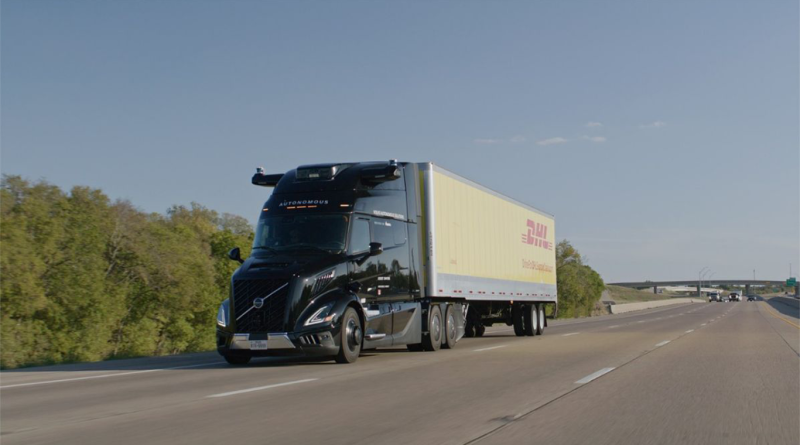Volvo’s Autonomous Trucks Debut in Texas with DHL Partnership
The launch of Volvo’s autonomous trucks in partnership with DHL Supply Chain marks the beginning of a new era in freight transportation, with autonomous technology designed to enhance efficiency, safety, and sustainability in supply chain operations. Leveraging state-of-the-art autonomous driving systems, Volvo and DHL aim to address the growing demand for freight capacity while setting a benchmark for the adoption of autonomous solutions in real-world logistics.
The pilot project is currently underway in Texas, a key logistics hub in the United States, with autonomous freight operations active along two major routes: Dallas to Houston and Fort Worth to El Paso. These routes are vital for connecting economic centers, and the deployment of Volvo VNL Autonomous trucks signifies a transformative moment for the region’s supply chain landscape.
The partnership between Volvo and DHL Supply Chain
Volvo Autonomous Solutions (V.A.S.) and DHL Supply Chain have joined forces to spearhead the integration of autonomous technology into freight logistics. The collaboration is focused on improving operational efficiency, reducing costs, and tackling challenges like driver shortages that continue to impact the trucking industry.
During this pilot phase, autonomous Volvo VNL trucks equipped with the Aurora Driver system are being tested with safety drivers on board. These professionals ensure that the transition to fully autonomous operations is seamless and secure, with minimal disruptions to the existing logistics network.
The operations are concentrated on Texas’s high-volume freight corridors, chosen for their economic significance and infrastructure readiness. The Dallas-Houston and Fort Worth-El Paso routes represent a strategic opportunity to evaluate the trucks’ performance, ensuring they can meet the demands of real-world logistics while prioritizing safety and reliability.
Technology powering Volvo’s autonomous trucks
At the heart of this initiative is the Volvo VNL Autonomous truck, a vehicle designed with cutting-edge technology to navigate complex highway environments safely and efficiently. Central to its capabilities is the Aurora Driver, an advanced system that combines artificial intelligence with a robust sensor suite, including high-resolution cameras, long-range lidar, and imaging radar.
One of the standout features of the Volvo VNL Autonomous is its emphasis on safety. The truck incorporates built-in redundancies for critical systems, such as braking and steering, to maintain full functionality even in the event of system failures. Additionally, the Aurora Driver undergoes rigorous testing to ensure it can handle the diverse challenges posed by real-world operations, from high-traffic urban areas to long stretches of open highway. The trucks are also equipped with sophisticated software that allows them to make split-second decisions based on live data.
Impacts on the logistics industry
The introduction of autonomous trucks represents a paradigm shift in the logistics sector. By enabling greater freight capacity, these vehicles address one of the industry’s most pressing issues: the growing demand for transportation services amidst a persistent driver shortage. Autonomous trucks can operate for extended hours without the limitations imposed by human drivers, thereby optimizing delivery schedules and reducing downtime.
Moreover, safety is significantly enhanced with autonomous technology. Systems like the Aurora Driver are designed to eliminate common causes of accidents, such as fatigue and distractions, making highways safer for all road users. The advanced sensors and AI capabilities also allow the trucks to respond to hazards with greater speed and precision than human drivers could achieve.
From an operational perspective, the use of autonomous vehicles helps companies like DHL streamline their supply chains. With predictable and reliable transportation schedules, businesses can better manage inventory and reduce costs associated with delays. This efficiency, coupled with the reduced environmental impact of optimized driving patterns, positions autonomous trucking as a sustainable solution for the future.
The collaboration between Volvo and DHL Supply Chain underscores the growing momentum behind autonomous vehicle adoption in the logistics industry. Building public trust and gaining regulatory approval are essential steps for integrating autonomous vehicles into the broader transportation network. Volvo’s commitment to safety, exemplified by its robust redundancies and real-world testing, positions the company as a leader in setting industry standards.
Beyond the current pilot in Texas, the long-term implications of autonomous trucking are far-reaching. Widespread adoption could transform how goods are transported across the country, reducing dependence on traditional trucking fleets and paving the way for smarter, more efficient supply chains. Additionally, advancements in autonomous technology could inspire innovation in other areas, such as urban mobility and last-mile delivery.
Sources:
To keep up-to-date with our latest transportation and logistics news, subscribe to our newsletter today.
